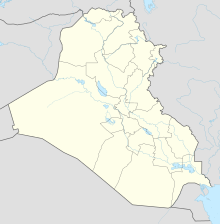Shaibah Air Base
Shaibah Airport Shaibah Air Base RAF Shaibah | |||||||||||||||||||
|---|---|---|---|---|---|---|---|---|---|---|---|---|---|---|---|---|---|---|---|
 Map of RAF Shaibah, 1947 | |||||||||||||||||||
| Summary | |||||||||||||||||||
| Airport type | Private Ex-military | ||||||||||||||||||
| Owner | Iraqi Government | ||||||||||||||||||
| Operator | Unknown Iraqi Army MND(SE) Iraqi Air Force Royal Air Force | ||||||||||||||||||
| Serves | Shaibah | ||||||||||||||||||
| Location | Shaibah, Basra Province | ||||||||||||||||||
| Built | 1920 | ||||||||||||||||||
| In use | 1920-present | ||||||||||||||||||
| Elevation AMSL | 276 ft / 84 m | ||||||||||||||||||
| Coordinates | 30°25′34″N 047°38′34″E / 30.42611°N 47.64278°E | ||||||||||||||||||
| Map | |||||||||||||||||||
 | |||||||||||||||||||
| Runways | |||||||||||||||||||
| |||||||||||||||||||
Shaibah Air Base is a former Iraqi Air Force airfield in the Basrah Governorate of Iraq.
History
Royal Air Force use
It was established by the Royal Air Force in 1920 as RAF Station Shaibah, a small and primitive airfield in the desert with a harsh hot and humid climate. The resident squadron was No. 84 Squadron RAF until 1940 when No. 244 Squadron RAF took over. It expanded during the Second World War. No 244 Sqn was involved in the Rashid Ali rebellion in 1941. Nos 37 and 70 Squadrons (Wellingtons) operated from Shaibah in support of RAF Habbaniyah.[1] On 24 April that year, 400 men of the King's Own Royal Regiment were "flown by No.31 Squadron [from India via] Shaibah to RAF Habbaniyah to reinforce the armoured cars of No.1 RAF Armoured Car Company."[2] By July 1942 RAF Shaibah was under the control of the RAF's Air Headquarters Iraq (see AHQ Iraq and Persia). At this time several units were located at Shaibah. They included:[3]
- No. 115 Maintenance Unit RAF
- No. 119 Maintenance Unit RAF
- No. 8 S & T Column
No. 5153 Squadron of the Airfield Construction Branch RAF was engaged in building works at Shaibah during the war.[4]
Squadron Leader Kenneth Hubbard was Station Commander of RAF Shaibah in 1951-53 when the station was involved in the evacuation of the British personnel from Abadan in Persia/Iran. He received the Order of the British Empire in 1953.[5]
Iraqi Air Force use
On 1 March 1956 it was handed over to the Iraqi Air Force,[6] and it then became an Iraqi Air Force airfield.
The airfield was bombed by a flight of four Mk.82-equipped McDonnell Douglas F-4 Phantom IIs as part of the Operation Revenge launched by Iranian Air Force two hours after the Iraqi invasion of Iran. According to Iranian sources, the Mikoyan-Gurevich MiG-25s and some Mikoyan-Gurevich MiG-23 were stationed in this airbase.[7] The airbase was again bombed in the large-scale Operation Kaman 99 on the second day of the war.[8]
It was abandoned after Operation Desert Storm in 1991.
War in Iraq of 2003
It was captured by Coalition forces during the Iraq War of 2003 and it became the site of a British Military Hospital and the Shaibah Logistics Base (SLB), but the original RAF buildings remain. While the SLB was in operation it was home to British, Dutch, Czech, Danish and Norwegian forces.
The following British units were posted here at some point under Operation Telic:
- 29 Armoured Engineer Squadron, 35 Engineer Regiment attached to 28 Engineer Regiment constructing a 1,500 man ECI camp.[9]
- 150 Transport Regiment RLC(V) personnel on attachment to 1 (GS) Regt RLC during Op Telic 1
- 160 Transport Regiment (V) RLC on attachment to 2 (Close Support) Battalion REME, from 28 February 2003 until 19 August 2003.[9]
- East of England Regiment (Volunteers) (EER(V)) during Operation Telic 1, 2 and 6 maintaining the security of the base.[9]
- 105th (Scottish and Ulster) Regiment Royal Artillery attached to 19th Regiment Royal Artillery during Op Telic 5 as 13 Headquarters (HQ) Battery.[9]
- 200 Battery, Royal Artillery between May 2004 and February 2005.[9]
- 210 Battery, Royal Artillery (V) providing force protection during Telic 4.[9]
- 220 Battery, 104th Regiment, Royal Artillery Telic 4 between April 2004 and December 2004 providing force protection until December 2004 when the RDG took over.[9]
- 269 Battery, Royal Artillery.[9]
- 8 TPT Regiment (8LSR) between May 2004 and November 2004 consisting of 3 Tank Transporter Squadron, 5 GT Squadron & 13 GT Squadron.[9]
- A detachment 9 Supply Regiment from March 2003 until unknown.[9]
- 84 Medical Supply Squadron, RAMC between August 2003 and unknown.[9]
- 22 Field Hospital.[9]
- 207 (Manchester) Field Hospital (Volunteers) providing the lead unit for the field hospital between April 2004 and August 2004.[9]
- A Company, 1st Battalion The Royal Irish Regiment.[9]
In 2007 the SLB was handed over to the Iraqi Army.
Current use
The base is currently by the Iraqi Military as a small base.
See also
- Operation Telic order of battle
- List of United Kingdom Military installations used during Operation Telic
References
- ^ Royal Air Force Historical Society Journals, 48, p45.
- ^ https://www.rafmuseum.org.uk/research/history-of-aviation-timeline/interactive-aviation-timeline/british-military-aviation/1941.aspx; Royal Air Force Historical Society Journals, 48, p44.
- ^ https://web.archive.org/web/20100430201508/http://rafweb.org/Members%20Pages/ORBs/1942/1942_07_Middle_East.htm. Archived from the original on 30 April 2010. Retrieved 13 July 2013.
{{cite web}}: Missing or empty|title=(help) - ^ "Land of Hope and Glory - Bill Carter".
- ^ Dropping Britain's First H-Bomb.
- ^ Tony Fairbairn, ACTION STATIONS OVERSEAS, pg. 165
- ^ http://www.tarikhirani.ir/Modules/files/Phtml/files.PrintVersion.Html.php?Lang=fa&TypeId=35&filesId=335
- ^ http://www.hamshahrionline.ir/details/200435
- ^ a b c d e f g h i j k l m n "Operation Telic: British Forces Deployed". Britain's Small Wars. Archived from the original on 20 August 2014. Retrieved 17 November 2013.
External links
airfields

